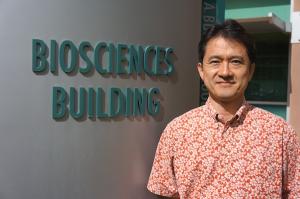Medical researcher helps journal launch its first bilingual podcast
University of Hawaiʻi at MānoaContact:
Posted: Oct 23, 2012
The American Journal of Physiology-Heart & Circulatory Physiology has announced its first-ever podcast in both English and Japanese, which features a UH Manoa researcher who is himself trying to uncover new treatments and ways to prevent heart attack and heart failure.
“The John A. Burns School of Medicine (JABSOM) was founded to provide medical knowledge to Hawaii and the Pacific region, and the recognition of Dr. Takashi Matsui as an expert and his participation in this new bilingual podcast illustrates how we work to build academic bridges locally and around the world,” said Jerris Hedges, MD, Dean of JABSOM.
Dr. Matsui, with the JABSOM Center for Cardiovascular Research and the Department of Anatomy, Biochemistry and Physiology, was invited to take part in the podcast because the journal considers him “a leading expert” in cardiovascular research. Along with Associate Editor Dr. Masafumi Kitakaze, Dr. Matsui interviewed Dr. Toshio Nagai of the Chiba University Graduate School of Medicine about a review article by Drs. Nagai and Komuro, “Gene and Cytokine Therapies for Heart Failure,” published in the journal.
“Acute myocardial infarction (heart attack) and heart failure are major concerns in public health of Hawaii because risk factors of these diseases such as diabetes and obesity are commonly observed here,” said Dr. Matsui. "Therefore, to develop novel therapeutic approaches to preventing or treating the diseases is very important in this community.”
In the podcasts, Dr. Matsui serves as a leading expert in both English and Japanese versions. To better understand the topic, Dr. Matsui was asked to explain cytokine therapy. His answer was that cytokines are small cell signaling proteins that are secreted by multiple cells in the body. “Some cytokines protect the heart by preventing cell death or by enhancing local blood flow," Dr. Matsui said. “Since cytokines are not artifical agents (but proteins produced in the body), there is less concern about safety for clinical application."
Dr. Matsui’s own laboratory investigates signal transduction pathways that play an important role in myocardial infarction and cardiac hypertrophy, two important precipitants of heart failure. They focus on the role of mechanistic target of rapamycin (mTOR), which is a key molecule of insulin receptor signaling pathway in the heart.
Because of the important role of mTOR in insulin signaling, Dr. Matsui’s lab is working to determine the role of mTOR in diabetic hearts, and exploring the mTOR signaling pathway as a novel therapeutic target for treatment of heart failure in diabetes. This project has been being supported by his NIH R01 grant since 2010. R01 grants are the original and historically oldest grant mechanism used by NIH, awarded to proven scientists for specific research.
For the abstract, see http://ajpheart.physiology.org/content/303/5/H501./
For the English podcast, see http://ajpheart.podbean.com/2012/10/04/gene-and-cytokine-therapy-for-heart-failure/.
For the Japanese podcast, see http://ajpheart.podbean.com/2012/10/04/japanese-version-gene-and-cytokine-therapy-for-heart-failure/.
For the JABSOM homepage, see http://jabsom.hawaii.edu/jabsom/.
For more information, visit: https://sites.google.com/site/ccrheart/research/matsui-lab

